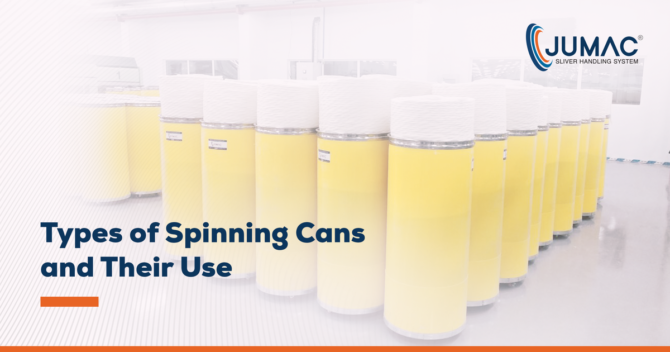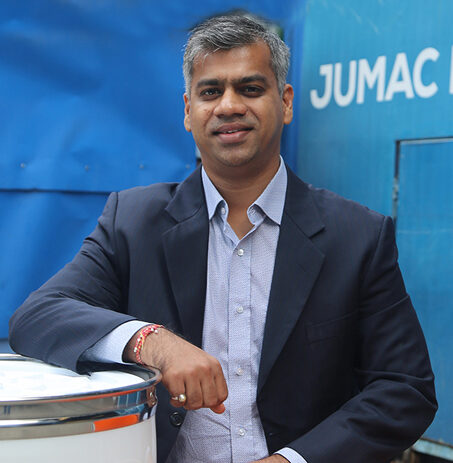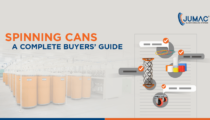The role of quality-assured spinning cans in ensuring optimal yarn…

Types of Spinning Cans and Their Use
The standard workflow of textile & yarn production is simple enough. In order to manufacture superior-quality yarns, the best sliver (with zero imperfections) are required. For ensuring that the sliver is of the best quality, the sliver handling techniques have to be optimal as well. This brings to light the importance of customised spinning cans – and the role they play in bolstering the yarn quality from the very start. Over here, we look at some varieties of sliver cans and their respective uses:
Spinning Cans For Carding
These spinning cans are generally used to ensure uniform sliver continuity – so that there are no glitches in the yarn processing stages. The cans make sure that nearly all the key sliver properties are maintained, and they can be used in sophisticated yarn spinning machinery.
The husks and neps in the sliver are formed during the carding process. These, in turn, serve as important parameters in the final textile and yarn features. The carding cans ensure that the sliver quality is not compromised in any way.
Carding cans are typically easy to use and maintain, and can be utilised for different types of sliver handling. The ergonomic designs and accessibility of these cans add to their convenience factor. The process of separating the fibres, and then assembling them into slivers (also known as ‘tows’), is made efficient and seamless.
Breaker Draw Frames
In order to boost the overall efficiency of the downstream machinery, top spinning can manufacturers, like Jumac Cans, design powerful breaker draw frame cans. The best cans of this type have significantly higher sliver loading capacities – as a result of which, downtimes for changing the cans go down significantly.
The breaker draw frame cans simplify the process of single sliver conversion and formation. Since the sliver movement is managed in an end-to-end manner by these spinning cans, the fibre blending becomes uniform and smooth. There is minimal mechanical fatigue – and can replacements are not required frequently.
Pre-tested breaker draw frames (when sourced from reputed manufacturers) can improve the overall sliver load capacity by 10-12%. Also, since the can change count is lower, sliver piecing is also much lesser – and the yarn quality remains optimal.
Spinning Cans For Combing
Improved productivity and excellent flexibility are the biggest advantages of premium-grade comber cans. The combing movements in these cans are expertly synchronised – ruling out sliver imperfections. Cutting-edge technology is used to refine the combing process and make it more efficient.
The top spinning can manufacturers make sure that their products have best-in-class active combing areas. The noil extraction height is generally customisable – in order to meet the varying market demands. The piecing and lap changing processes are made more streamlined as well.
Apart from nep-removal, usage of combing cans also makes sure that there are no other inconsistencies in the sliver. As a result, the yarn quality becomes high – and there is practically no sliver wastage. The overall fibre utilisation process is fully optimised, and there are minimal (if any) irregularities.
Finisher Draw Frames
These spinning cans are responsible for finalising the key properties of the sliver. Therefore, they have to be very carefully chosen – to ensure that the yarn output is of the desired quality. The breaker slivers (generally, 6 to 8 slivers at a time) are used as inputs in these cans, while the uniformly parallel ‘finisher sliver’ is obtained as the end-product.
Given the sensitivity and relatively complicated nature of this process, manufacturers typically offer customised finisher draw frame cans – with robust features and high longevity. The creeling area, draw frame zone, the suction waste and other areas/parts of the cans have to be cleaned regularly, to avoid sliver degradation.
Roving Cans
The sliver obtained from finisher draw frames have to be fed into the roving cans for further processing. With the help of sophisticated drafting, the density of the sliver is reduced (i.e., linear density is reduced). After that, the roving cans are used to insert the twist for yarn manufacturing.
Creeling, twisting, drafting and laying are some of the key tasks performed by the roving cans. Due care is taken to maintain the functionality of the cans – so that there are no chances of roving breakage and/or bobbin tensions. Roving cans manufactured by the best sliver can manufacturers are not affected by dust accumulation and blockages.
Using substandard roving cans is one of the biggest causes for winding, defective sliver twisting, and package building glitches. With state-of-the-art customisations, the best cans ensure that these problems do not crop up – and the bobbins are always of the optimal quality.
Special Cans
The spinning can industry is constantly evolving – with the role of technology becoming more and more prominent in this sector. Many reputed manufacturers implement innovative technologies to design various types of special cans, with custom features and enhanced usability.
The bump press cans and perforated cans manufactured by Jumac serve as classic examples in this regard. The futuristic XL 1200 carding can (which significantly bolsters draw frame efficiency) also warrants a special mention. These cans are ideal to meet specific spinning requirements of yarn manufacturers.
In the context of spinning cans, the importance of high-quality accessories simply cannot be overemphasised. For the sliver cans to function optimally, have good service lives, and deliver excellent value for money – they have to be custom-fitted with caster wheels, springs (box/pantograph), top/bottom rims, identification bands, and other key parts. Apart from enhancing the functionality of the spinning cans, these accessories also remove sliver imperfections and take yarn quality to the next level.
Given the sheer variety in yarn spinning needs, each of these spinning can types are important. Leading sliver can manufacturers, hence, have all of them in their portfolio – along with the other requisite tools and accessories. Buyers need to be sure about the precise type of yarn spinning they need, and select the ‘correct’ spinning cans accordingly.

Passionate about transforming the industrial sector of textile and spinning industry with innovative solutions. Director at Jumac Manufacturing, leading spinning cans and accessories manufacturer and exporter from Kolkata, India.









